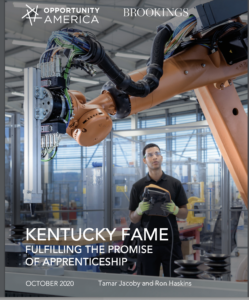This is why I love my work.
I get inspired by studies like this one, that show us new ways of imagining education, of envisioning the connection between school and work, can become reality, and can — and do — work for real people.
The focus of the Opportunity America-Brookings Institution study is a 10-year-old program called the Federation for Advanced Manufacturing Education (FAME). It is a national network of nearly 400 companies in 13 states that partner with community colleges to provide job training for industrial maintenance technicians.
The Wall Street Journal ran an excellent article on the study and the program on Oct. 20, the report’s release date. It offers an excellent synopsis if you subscribe, or can pierce the paywall. NPR did a story as well.
You can also get a big dose of data by studying this infographic, which accompanies the report.
The Journal reports:
“Students of FAME—a mix of new high-school grads and older factory workers well into their careers—typically spend two days a week in class and three days on the factory floor, earning a part-time salary. They learn to maintain and repair machinery; traditional subjects such English, math and philosophy; and soft skills such as work ethic and teamwork. After earning an associate degree, most work full time for the factories that sponsored them.
Here are some highlights from the study:
- FAME students “were significantly more likely to graduate than other students at the same community colleges— roughly 80 percent of FAME students completed their program of study, compared to 29 percent of non-FAME students.,” the study says.
- “Employment and earnings gaps were even more striking. Five years after completing the FAME program, graduates’ median earnings were nearly $98,000 — $45,000 a year more than the earnings of other career and technical education graduates from the same colleges.”
- Almost all program graduates — 94 percent — said on-the-job training was the most valuable aspect of the program. Almost the same percentage said the combination of classroom learning and hands-on experience was extremely valuable.
When I envision the Untapped Potential Project Schools that will launch in the near future, I see a program similar to FAME, but starting even earlier in people’s lives.
There is no reason a similar program cannot start at 10th or 11th grade. Imagine graduating from high school with not only an associate’s degree, but the kind of hands-on training that makes you a top candidate for a job that within a few years will be paying you north of $100,000.
That’s the future. And it starts now.

